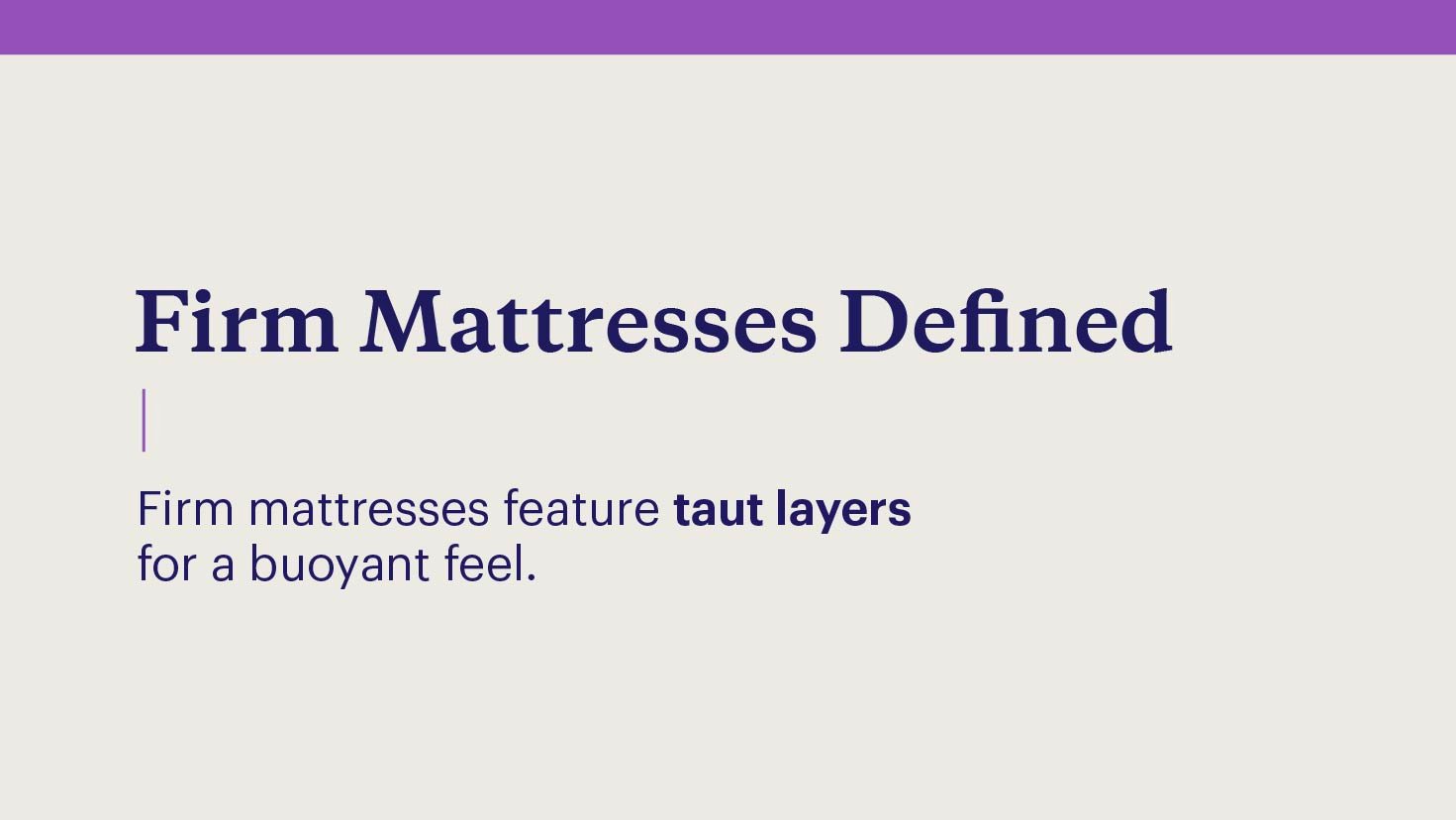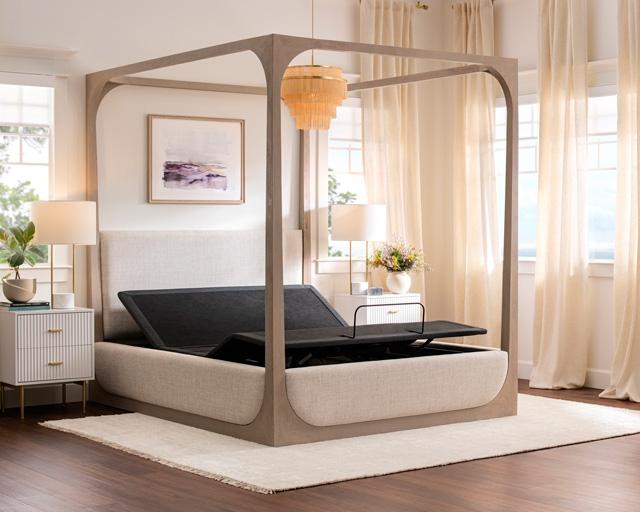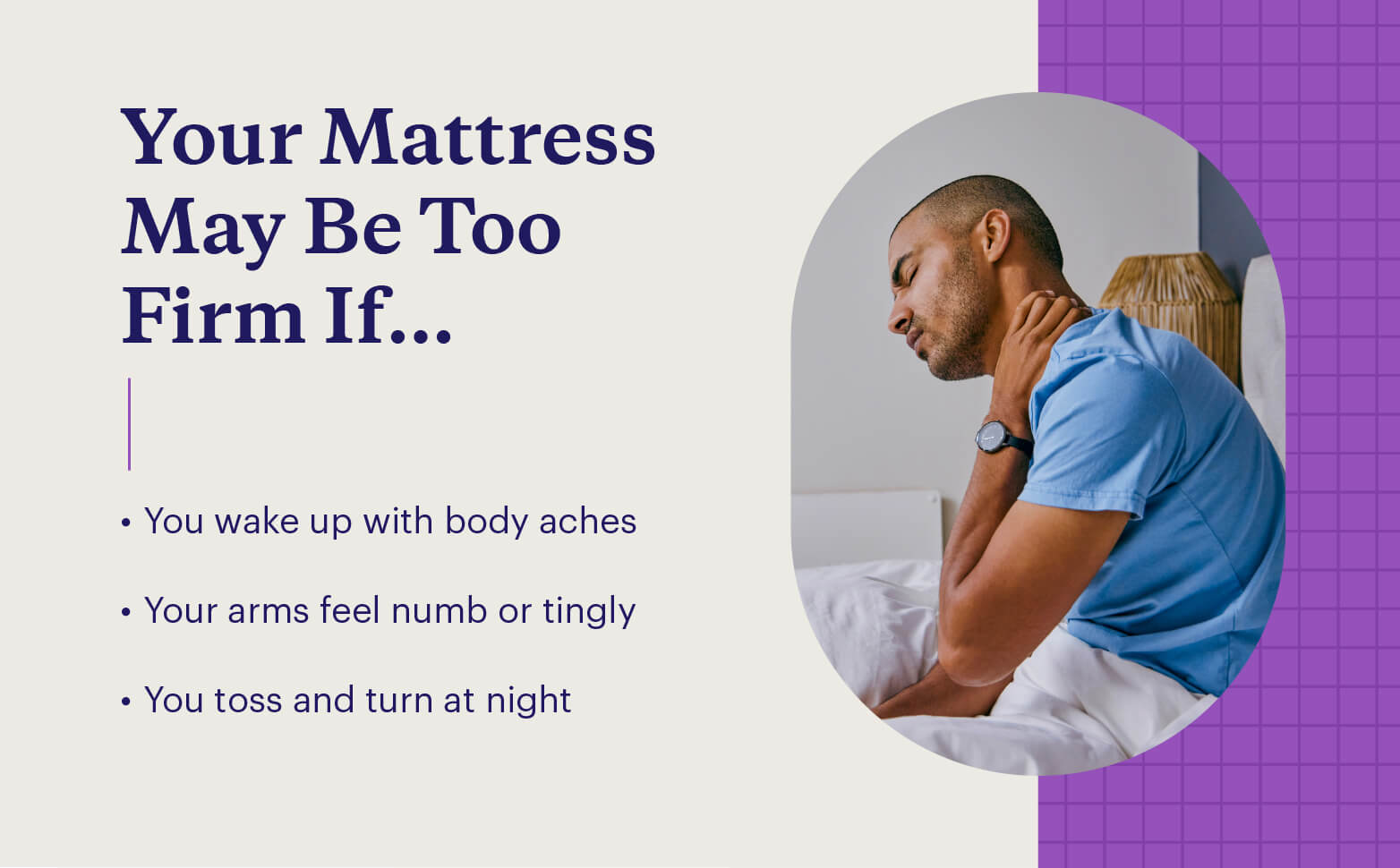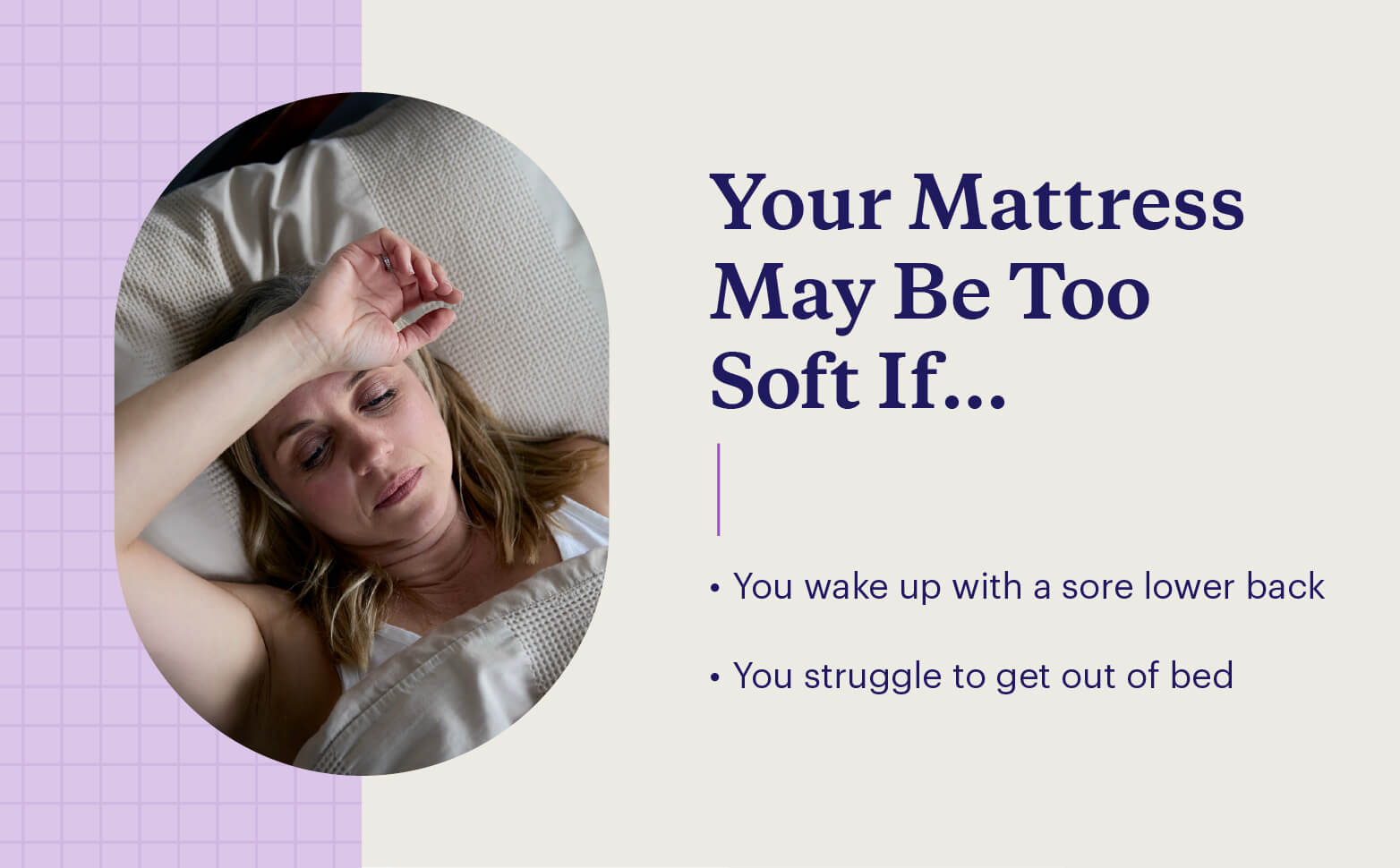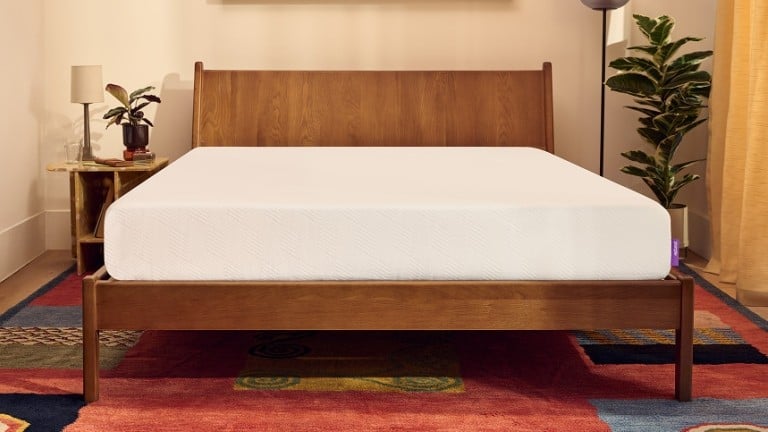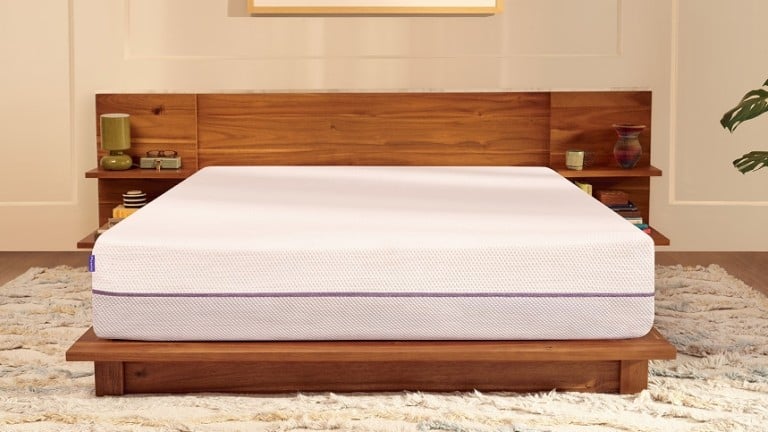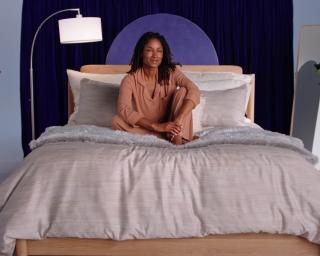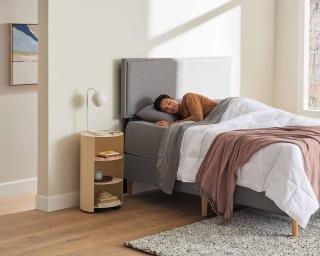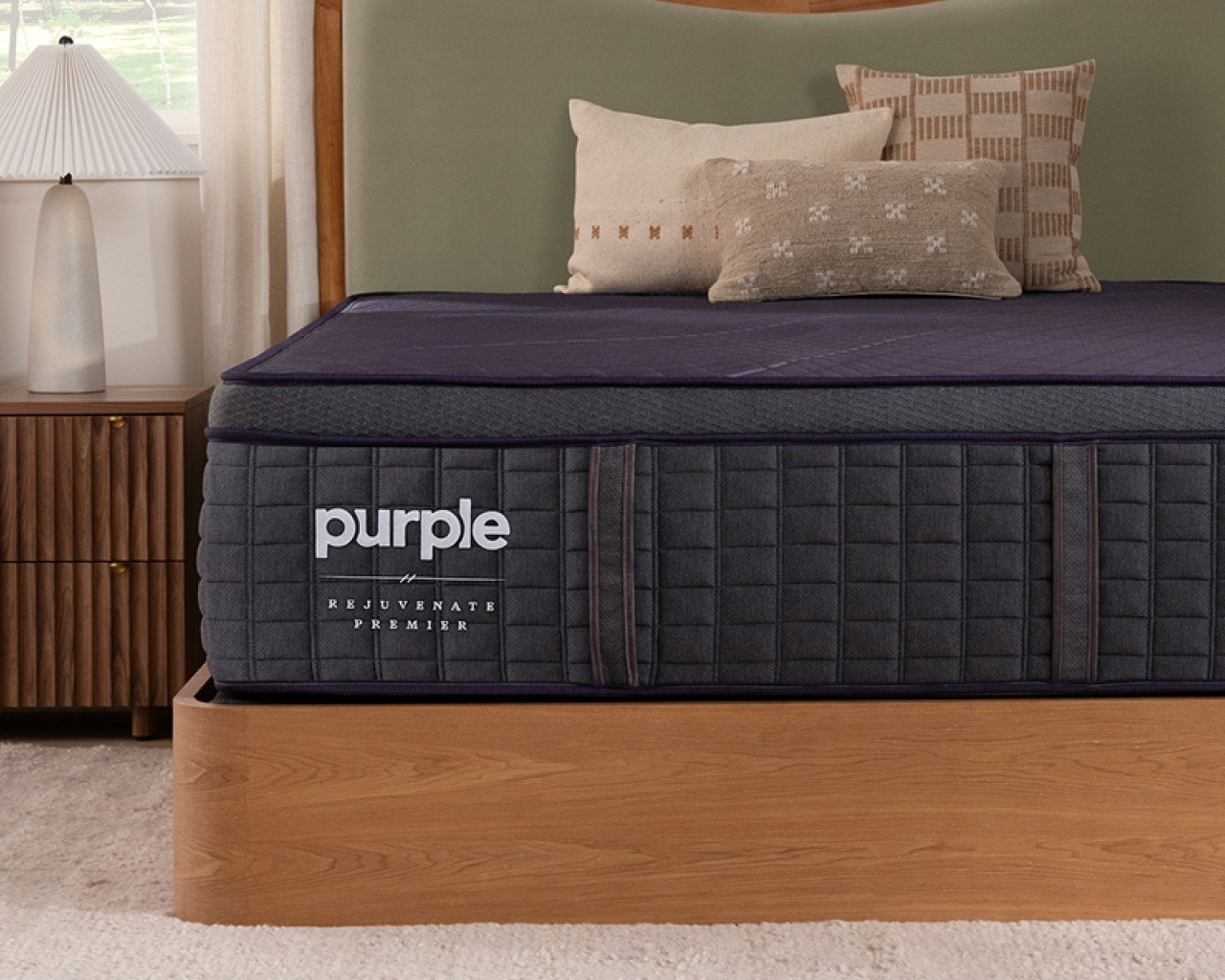
Plush vs. Firm Mattress: Pros, Cons, and Key Considerations
What is the difference between firm and plush mattresses?
Plush mattresses are softer and provide a more cushioned surface, while firm mattresses offer a more buoyant, less yielding feel. Both hard and soft mattresses can provide support, pressure relief, and spinal alignment depending on each sleeper’s needs and preferences.
When searching for a new mattress, deciding between a plush vs. firm mattress can present a challenge. A variety of factors come into play including health considerations, sleep needs, and sleep partner’s preferences, to name a few.
Ultimately, the decision relies most on your comfort level upon each surface. While you can make mattresses firmer, it’s better to choose the right mattress from the start to ensure you get the comfort and support you need.
Purple mattresses are neither firm nor soft; they’re in a league of their own. The GelFlex Grid® instantly adapts to your body, providing unparalleled pressure relief and full-body support that surpasses standard plush and firm mattresses.
If you’re trying to decide between plush and firm mattresses, read along to find what is the right fit for you.
What Is a Plush Mattress?
Plush mattresses are soft, conforming mattresses with minimal firmness, often falling between a 1 and 3.5 on the mattress firmness scale.
You can tell a plush mattress apart from a firm mattress by the way the top layers “collapse” when you apply pressure. Because they tend to have a thicker top layer, plush mattresses usually hug your body as you fall into them, and these soft layers also help reduce motion transfer.
A plush or soft mattress offers a gentle hug-like feel, typically achieved through multiple material layers like memory foam, latex, or pillow-tops. This design not only cradles the body but also alleviates pressure points, making it a great choice for side sleepers or those with chronic joint pain.
Plush mattresses’ super-soft surface is often faulted for inhibiting one’s ability to easily change sleep positions throughout the night. Sleepers who weigh less than 130 pounds tend to maintain ease of movement since their body weight does not sink into the mattress as deeply as heavier sleepers.
Plush Mattresses Pros and Cons
Benefits | Considerations |
Gently molds around the body | Difficulty changing positions |
Good motion isolation | Less ideal for heavier individuals |
Soft layers may offer more pressure relief | May sleep hot |
May be more comfortable for side sleepers | May lack support for stomach sleepers and heavier individuals |
In addition to their softness, plush mattresses offer several advantages for those seeking a cloud-like sleep experience. Keep in mind that the pros and cons vary significantly between manufacturers and material quality. Here are a few potential benefits of plush mattresses:
- Motion isolation: Plush mattresses absorb and minimize motion transfer. This means that if one person shifts positions, the movement is less likely to disturb their sleeping partner, making them a great mattress for couples.
- Body cradling for joint pain: Plush mattresses are known for how they cushion the body, making them a preferred choice for individuals with joint pain. The soft layers conform to the contours of the body to help alleviate pressure points.
- Easier to transport: Plush mattresses are often made of more flexible materials compared to their firmer counterparts. This makes them easier to transport for those who move frequently or rearrange their living spaces often.
Who Should Consider a Plush Mattress?
Plush mattresses provide a soft, body-conforming feel that many sleepers prefer over the taut, supportive feel of firm mattresses. As a result, plush mattresses generally appeal to:
- Side sleepers: The soft, cushioning layers of a plush mattress tend to allow your shoulders and hips to move deeper into the mattress, alleviating pressure points and promoting proper spinal alignment for side sleepers.
- Sleepers with hip and joint pain: Plush mattresses offer a soft yet supportive surface that can help alleviate pressure points and reduce joint pain.
- Sleepers who like the feeling of being hugged: Often associated with memory foam mattresses, the soft, conforming layers of a plush mattress create a cocoon-like effect as it conforms to the body.
Looking for a mattress with the benefits of memory foam that doesn’t trap heat or feel restrictive? Purple mattresses cradle your pressure points and promote alignment no matter what position you prefer while dissipating heat to keep you comfortable.
What Is a Firm Mattress?
Firm mattresses offer a more rigid feel while feeling less soft than plush mattresses. They are often made from a selection of durable layers with very little flexibility or give. As a result, sleepers experience a floating feeling rather than sinking sensation.
Firm mattresses promote proper spinal alignment for stomach and back sleepers. Firmer mattresses ensure your hips won’t sink into the mattress, which can alleviate back pain. Sleepers who weigh over 200 pounds may prefer firm mattresses for a more even distribution of their weight.
Firm Mattresses Pros and Cons
Benefits | Considerations |
Even weight distribution | May cause joint aches for side sleepers |
May offer better support for stomach sleepers and heavier individuals | May be too firm for some sleepers |
Easy to change sleeping positions | May place pressure on shoulders and hips |
Firm mattresses feature an array of benefits that vary between mattress manufacturers and quality. Benefits of firm mattresses include:
- Even weight distribution: Firm mattresses evenly distribute body weight, which can help relieve pressure points. This feature is good for those who want support without compromising comfort.
- Spinal alignment: Firm mattresses are designed to promote a neutral spine position while sleeping, which may help reduce back pain.
- Ease of movement: The firmness makes switching sleeping positions easier. Unlike soft mattresses, firm mattresses offer a responsive surface with minimal resistance.
Who Should Consider a Firm Mattress?
Those seeking more rigid support from their sleeping surface may prefer firm mattresses over plush mattresses. Firm mattresses generally appeal to:
- Stomach or back sleepers: People who prefer these sleeping positions may benefit from a firmer sleep surface.
- Sleepers with lower back pain: Those looking for a mattress to relieve back pain may find relief on a firm mattress. The solid foundation helps align the spine for a more comfortable sleep.
- Sleepers who prefer a buoyant feel: Firm mattresses provide a stable surface to accommodate sleepers who prefer a more elevated and less sinking feeling.
The PurpleFlex™ Mattress is our firmest option, combining the instantly adaptive GelFlex Grid® with durable foam to support your back and relieve pressure where you need it most.
While the PurpleFlex™ Mattress provides a firm sleep surface, it may not provide the best support for larger sleepers. For added comfort and support in a firmer bed, consider the Purple Mattress® or Restore® Hybrid Mattress.
How To Choose Between a Firm vs. Soft Mattress
Personal preference plays the biggest role in deciding which mattress to choose. Unless you have specific requirements for your health, plush and firm mattresses can give you a restful night’s sleep. Many sleepers like to try out different mattress firmness before deciding which one feels right for them.
Rather than focusing on plush and firm feels, you may have better luck considering other factors, such as how different mattresses suit different sleeping positions, body sizes, and health considerations. As you weigh your options, take the following factors into account to help you decide.
1. Evaluate Your Sleeping Position
People with different sleep styles may prefer varying feels for pressure relief and support, but mattress firmness doesn’t always correspond to those features. Ultimately, you should look for a mattress that promotes spinal alignment and minimizes joint pain.
Depending on your preferred sleep position, you should look for a mattress that provides the following:
- Side sleepers often need a mattress that provides plenty of pressure relief that cradles their hips and shoulders. While softer mattresses may offer a cushioned feel, too-soft beds may result in misalignment.
- Back sleepers may get better weight distribution and spinal alignment on medium-firm mattresses, but they should primarily look for a mattress that keeps their shoulders, back, and hips aligned with enough pressure relief for sensitive joints.
- Stomach sleepers may get the most support on firm mattresses to keep their lower backs from sagging out of alignment. People who sleep on their stomach should opt for a mattress that keeps their spine aligned while providing pressure relief for their neck, hips, and knees.
- Combination sleepers can find support and pressure relief in a range of feels and firmnesses. Considering your dominant sleep position or the one you find most comfortable should help you determine the best mattresses for combination sleepers.
2. Factor in Your Body Size
Individuals with a heavier body weight may prefer a firmer mattress. Firm mattresses offer more consistent support for spinal alignment without allowing you to sink too deeply into the mattress.
Softer mattresses can offer some degree of support for lighter sleepers, but heavier individuals may find that these beds have lower weight limits and may sag prematurely beneath them, resulting in reduced comfort.
3. Think About Your Health
Chronic pain, sleep disorders such as obstructive sleep apnea (OSA), and other health considerations should factor into your choice. Be sure to research preferred mattress firmness levels based on specific health needs.
In general, your mattress plays a role in back support, pressure relief, and joint pain, which all impact whole-body health. For example, softer mattresses may alleviate hip pain and give pressure relief to side sleepers, meaning deeper sleep and rejuvenating rest.
If you need better back support, a firm mattress will help keep your spine aligned as you sleep. Firm mattresses also provide more even weight distribution throughout the night.
Sleeping flat on your back can worsen sleep apnea symptoms in some individuals with OSA. Sleeping with your head elevated may help to relieve these symptoms.1 An adjustable base like the Purple Premium Plus Smart Base can make sleeping elevated easier and more comfortable.
4. Assess Your Temperature Preferences
Hot sleepers can find relief from certain types of both plush and firm mattresses. Plush mattresses constructed with materials like gel-infused memory foam or breathable materials provide better heat dissipation.
Some may assume that firm mattresses feature a denser construction of materials therefore limiting heat dissipation. In reality, a firm mattress’s ability to regulate body temperature depends on the construction and the materials used. If temperature balance is a primary factor in your search, be sure to consult with customer service or available resources for each mattress.
5. Consider How You Use Your Mattress
A good night’s sleep typically isn’t the only use for a mattress. It may be your work-from-home station, a cozy place to read, or a necessary addition to your guest room. How you plan to use your mattress plays a role when choosing between plush vs. firm mattresses. For example:
- If you share your bed with another person: It's important to consider both partners' preferences and needs. If one person prefers a soft feel while the other leans toward firm, you might compromise with a medium-firm option.
- If it’s a guest bed: When purchasing a mattress for a guest bed, medium-firm mattresses are a versatile choice for catering to the comfort needs of multiple people.
- If you plan to work or lounge in bed: A firm mattress may be better suited for activities that require a solid foundation, like working on a laptop or sitting up to watch TV.
6. Decide What You Prefer
The best mattress for you ultimately comes down to your personal sleep preference. If you prefer a cradling sensation that conforms to the contours of your body, plush mattresses or other pressure relief mattresses with soft layers may be the best choice. Conversely, you may want a firm mattress if you prefer a more solid surface with minimal sinkage.
It can be difficult to pinpoint your perfect mattress without trying it out in person first. If possible, visit a showroom so you can experience how each mattress feels. You can still order a mattress online whether you try it out in-store or not. Choosing a mattress with a trial period will also provide you plenty of time to test its comfort long term.
How To Tell if Your Mattress Is Too Soft or Firm
Firmness and softness are subjective. One person’s idea of a solid, supportive bed could feel like sleeping on pins and needles for another, and hard mattresses aren’t necessarily better for your back despite common claims.
So, how do you tell if your bed is too soft or too firm? The simplest answer is to try out a mattress and listen to your body. Observe any pain and discomfort you feel and in which areas.
Is Your Mattress Too Firm?
Here are some signs that your mattress may be too firm:
- You wake up with back, hip, shoulder, or neck pain: If you feel pain or discomfort at these pressure points, your mattress may be too firm. Stiffness in your knees, hips, and shoulders could suggest you need a different mattress.
- You experience numbness and tingling in your arms: Numbness and tingling could be a sign that your mattress doesn’t contour enough to alleviate pressure from the parts of your body that come into contact with the mattress the most.
- You toss and turn at night: Restless sleep could be a sign that your bed is too stiff for you.
Is Your Mattress Too Soft?
What happens if your mattress is too soft? Here are some of the most common issues people face when their mattress is too soft:
- Your lower back is sore: If you’re a back or stomach sleeper, a too-soft mattress won’t support your lower back enough to keep your spine properly aligned, resulting in back pain and stiffness.
- You struggle to get in and out of bed: Does it feel like you can’t pull yourself out of bed because you’ve sunk in too deep? Sinking into a memory foam or other soft mattress can make it harder to climb in and out of bed.
In many cases, these symptoms may arise from other factors as well, including the age of your mattress, mobility limitations, or existing medical conditions.
How Long Do Plush and Firm Mattresses Last?
The lifespan of any mattress can vary based on factors such as quality, usage, maintenance, and manufacturer. On average, a well-made and properly cared-for plush mattress can last from seven to 10 years.
If you’re experiencing the following problems with your mattress, you may need to replace it sooner:
- Your mattress has permanent dips: Permanent sagging and indents in your mattress can compromise support and negatively impact your sleep quality.
- You have breathing problems while you’re sleeping: If you experience breathing difficulties, allergies, or respiratory issues that seem to worsen during sleep, it could be an indication of allergen or irritant buildup within the mattress.
- You haven’t cleaned your mattress for a long time: Neglecting regular mattress maintenance, such as cleaning, can lead to the accumulation of allergens, dust mites, and other contaminants.
- You regularly wake up with sore muscles: Soreness may result from the lack of proper spinal alignment or the breakdown of mattress materials over time.
- You can’t settle comfortably into your mattress: If it’s challenging to find a comfortable position or if you constantly shift during the night, it may mean that your plush mattress no longer matches your sleep preferences.
How To Extend Any Mattress’s Lifespan
Proper care and maintenance can help you enjoy your new mattress for years to come. Here are a few general guidelines to extend the lifespan of your plush or firm mattress:
- Use a mattress protector: Investing in a high-quality mattress protector can help shield your mattress from spills, stains, and allergens. The Purple Mattress Protector® provides maximum protection and maximum comfort with a buttery soft top knit and enhanced stretch.
- Clean your mattress regularly: Regular mattress cleaning removes dust, allergens, and moisture that can accumulate over time. Vacuum your mattress and spot-clean stains by following the manufacturer's guidelines to maintain a hygienic sleep environment.
- Flip or rotate your mattress: Rotating your mattress every few months can promote even wear and prevent permanent indentations. This practice helps distribute the impact of body weight across different areas, preserving the overall integrity of the mattress.
- Regularly wash your sheets: Washing your sheets regularly prevents the buildup of dirt and allergens that can transfer to the mattress.
- Avoid eating and drinking in bed: Accidental spills and crumbs can damage your mattress over time.
- Don’t bounce on your bed: Excessive bouncing and jumping on the bed can strain the mattress springs and materials, leading to premature wear and tear.
- Clean spot stains and spills immediately: Promptly address any spills or stains to prevent them from growing mold. Use appropriate cleaning solutions recommended for your mattress and follow the manufacturer's guidelines to ensure you aren’t doing more harm than good.
Which Is Better, a Firm or Plush Mattress?
A trick question — when it comes to plush vs. firm mattresses, your personal preferences and needs determine what’s best. The key is to find what feels most comfortable to you. A high-quality mattress, regardless of firmness, should provide proper support, promote spinal alignment, relieve pressure points, and cater to your unique sleep preferences so you can get a restful and rejuvenating night's sleep.
Purple mattresses offer unparalleled support for a wide range of sleep needs. With our patented GelFlex Grid® technology, you get comfort and support exactly where you need it.
Talk to one of our Sleep Specialists to find out which Purple mattress is best for you. They'll help you choose the right firmness level and size for a comfortable night's sleep.
FAQ
Mattress firmness refers to the surface feel of a mattress, indicating how soft or firm it is. Mattress support refers to a mattress’s ability to maintain proper spinal alignment and provide adequate support to the body.
Plush and firm mattresses can be equally supportive when constructed with high-quality materials. The key lies in the density and durability of components like memory foam, innerspring coils, or Purple’s innovative GelFlex Grid®.
Mattress firmness is largely subjective, and finding the best fit often means looking past how soft or firm a mattress is and instead focusing on key features such as:
- Pressure relief
- Spinal alignment
- Temperature balance
- Motion isolation
- Edge support
- Durability
The firmness of a mattress doesn’t necessarily correlate with these features, so it’s important to prioritize what will actually keep you comfortable rather than making a decision based solely on feel.
Deciding between a soft vs. firm mattress depends on your personal preferences and specific sleep needs.
If you prefer a mattress that contours closely to your body like a hug, you might prefer a softer mattress. On the other hand, if you seek a more solid and supportive surface with minimal sinkage, a firmer mattress might be better for you.
Consider factors like comfort, spinal support, and any existing health considerations to make an informed decision based on your unique needs.
A plush mattress with plenty of pressure relief as well as support for spinal alignment may alleviate some back pain, but for some, a soft mattress may cause back pain. The softness of a mattress doesn’t always indicate how supportive and comfortable it is, so a mattress with sufficient pushback, pressure relief, and support is key.
Consider your personal comfort preferences, any existing back issues, and how well a mattress supports your spine when deciding whether a plush or firmer mattress is better for your back. When in doubt, ask a healthcare professional or mattress expert for personalized guidance based on your needs.
Firm mattresses may be more durable than softer mattresses depending on the materials and construction. Softer mattresses may start to sag sooner than firm mattresses, especially for heavier individuals and couples, but higher-quality mattresses are typically built with longevity in mind.
The main difference between a plush and pillow-top mattress lies in their construction.
Pillow-top mattresses are innerspring or hybrid mattresses that have an extra layer, called a “pillow-top,” for added comfort. This 1-inch layer is typically made of down, cotton, or other materials for extra softness.
A plush mattress, on the other hand, is an entire mattress created with a firmness level of 3 or lower. This softness applies to the whole mattress, not just one layer.
An ultra-plush mattress is characterized by exceptionally soft and cushioned construction that allows you to immediately sink into the surface. They typically include additional layers of luxurious materials like memory foam or pillow-tops that embrace the sleeper immediately upon lying down.
No, you shouldn't flip a plush mattress. Many mattresses shouldn’t be flipped unless they’re double-sided, as the other side is often an uncomfortable surface that lacks support.
Instead of flipping your plush mattress, rotate it once every three to six months to prolong its lifespan. This spreads out the pressure your body exerts on the mattress’s surface and evens out the effects of wear and tear.
More to Explore
Level up your sleep routine with our most-loved products.


